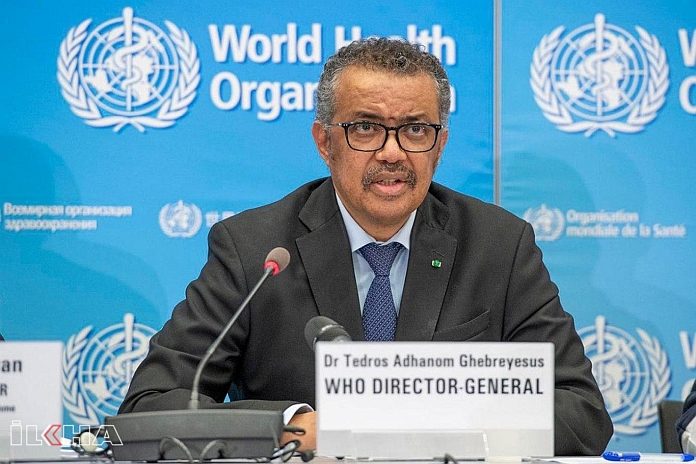By Caribbean News Global ![]()
GENEVA, Switzerland — More than 3.5 million cases of COVID-19 and almost 250,000 deaths have now been reported to World Health Organization (WHO), since the beginning of April, an average of around 80,000 new cases have been reported daily, however, more countries are considering how to ease so-called lockdown restrictions.
“These are not just numbers”, said WHO director-general Tedros Adhanom Ghebreyesus “every single case is a mother, a father, a son, a daughter, a brother, sister or friend.”
He continued: “Although the number of cases reported from Western Europe is declining, more cases are being reported every day from Eastern Europe, Africa, South-East Asia, the Eastern Mediterranean, and the Americas. However, even within regions and within countries we see divergent trends. Every country and every region needs a tailored approach. But the impact of the pandemic goes far beyond the numbers of cases and deaths.”
Around the world, the pandemic has caused severe disruption to essential health services – including community-based health care. Professional health workers like doctors and nurses play crucial roles, in many countries trained members of the community play a vital role in delivering essential health services like vaccination, prenatal screening, and the detection, prevention, and management of many diseases.
More countries are considering how to ease so-called lockdown restrictions, director-general Ghebreyesus reiterate the six criteria that WHO recommends countries consider:
First, that surveillance is strong, cases are declining and transmission is controlled;
Second, that health system capacities are in place to detect, isolate, test and treat every case and trace every contact;
Third, that outbreak risks are minimized in special settings like health facilities and nursing homes;
Fourth, those preventive measures are in place in workplaces, schools and other places where it’s essential for people to go;
Fifth, that importation risks can be managed, and;
Sixth, that communities are fully educated, engaged, and empowered to adjust to the “new norm”.
The risk of returning to lockdown remains very real if countries do not manage the transition extremely carefully and in a phased approach.
Director-general Ghebreyesus said that WHO, UNICEF, and the International Federation of the Red Cross have published guidance for countries on how to maintain community-based health care in the context of COVID-19. It includes practical recommendations for countries on sustaining essential services at the community level, leveraging community health workers for the response to COVID-19 while keeping them safe, and advice for how to adapt services for specific diseases and age groups.
“For example, it suggests using telemedicine wherever possible, and leaving insecticide-treated nets for malaria at the door of households, instead of asking people to collect them from a central location.”
“It is also vital that countries pay careful attention to the most vulnerable members of their societies. Crises can exacerbate existing inequalities, which is demonstrated in higher rates of hospitalization and death among certain populations in many countries. We must address this now and in the long-term by prioritizing diagnosis and care for those who are most at risk.
“This is not only the right thing to do, but it’s also the smart thing to do. We cannot end the pandemic until we address the inequalities that are fueling it,” he said.
Today’s guidance complements the United Nations framework for the socio-economic response to COVID-19, published last week. The framework lays out a “recovery roadmap” for countries to protect lives and livelihoods, and get businesses and economies up and running again as soon as possible. Importantly, the framework takes a “health first” approach, recognizing that strong and resilient health systems must be the foundation of recovery in all countries.
The pandemic has highlighted the importance of strong national and sub-national health systems as the foundation of global health security and universal health coverage.
Strong and resilient health systems are the best defence not only against outbreaks and pandemics but also against the multiple health threats that people around the world face every day. And yet, on current trends, more than 5 billion people will lack access to essential health services by 2030 – including the ability to see a health worker, access to essential medicines, and running water in hospitals.
“Gaps like these don’t just undermine the health of individuals, families, and communities; they also put global security and economic development at risk. The world spends around US$7.5 trillion on health each year – almost ten percent of global GDP. But the best investments are in promoting health and preventing disease at the primary health care level, which will save lives and save money. Prevention is not only better than cure, but it’s also cheaper, and the smartest thing to do,” said WHO director-general.
“The COVID-19 pandemic will eventually recede”, he said, “but there can be no going back to business as usual. We cannot continue to rush to fund panic but let preparedness go by the wayside.”
WHO director-general warned that “ As we work on responding to this pandemic, we must also work harder to prepare for the next one. Now is an opportunity to lay the foundations for resilient health systems around the world, which has been ignored for too long. That includes systems to prepare, prevent, and respond to emerging pathogens.
“If we learn anything from COVID-19, it must be that investing in health now will save lives later. History will judge all of us not only on whether we got through this pandemic but also on the lessons we learned and the actions we took once it was over.
“The antidote for this pandemic is national unity and global solidarity. Together, we will defeat COVID-19,” he said.





